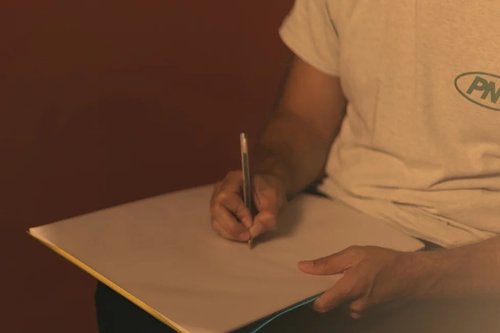Maximizing your resume's impact: aligning your skills with job descriptions
Jun 23, 2022 - updated Jun 21, 2022
4 mins

CN
Fondatrice de Dea Dia
Looking for work means responding to a lot of job postings. It’s tempting to save time by sending out a general resume that can work for different job titles and companies. However, by tailoring your résumé and cover letter to each job offer, you’re more likely to attract the recruiter’s attention.
Why should I adapt my resume
It’s essential to customize your resume and cover letter for each job application because it demonstrates to a potential employer that you are both motivated and the right match for their needs. Yes, this may take some time, but it can really make a difference.
Each company is unique, and so is each position. A recruiter should feel that you’re addressing them personally, and that you want to work in their company more than in any other.
See it from the recruiter’s point of view
Your recruiter is likely to have received dozens of applications. In the end, they’ll only remember the ones that match exactly what they’re looking for in terms of education, experience, personality, values, and so on. Therefore it’s important to take the time to really get a feel for the position and the company offering it.
To do this, put yourself in the recruiter’s shoes. Look at things from their point of view in order to define the ideal candidate’s profile. Next, analyze your career history from that angle. Pinpoint the experiences, expertise, and skills you can highlight to show that you are an ideal candidate. It’s not about making something up or distorting your work history but rather finding the right angle from which to approach it.
Give your resume a hook
Pay close attention to how you begin your resume: it’s key to getting your recruiter to want to read the rest. In a resume, this entails explaining its content immediately by adding a hook in a boxed text at the top of the page. This could be a job, qualification, skillset, or a summary of your employment history.
This is also useful if you’ve had an unusual career path because it allows you to give it context and make it look good. This hook must, of course, correspond to the expectations of the job posting to show the recruiter that you fit what they’re looking for. The content of your resume should then specifically illustrate this hook.
For example, if the job posting is for a creative director, it should say at the top of your resume that you are a creative director with a relevant degree and two years of experience. The rest of the resume then demonstrates that you do indeed have the background of a creative director, the professional expertise of a creative director, and the personality of a creative director.
Another example: you have spent the past two years traveling the world after graduating. You’ve just returned, and you’re looking for work. Write a brief boxed text that explains, in a few words, your experience, what you learned from it, and the skills it helped you to develop, all of which will ideally match those listed in the job posting.
Categorize your experiences
Your resume shouldn’t be a list of unrelated experiences, all given the same amount of detail. Depending on the company and the position, some of your experiences will be more relevant than others, which are the ones you need to focus on. Don’t ditch the others —nobody wants to send out a resume full of holes—you can bring them up in a briefer form.
For example, if you’re applying to a small company, highlight your experiences in a similar type of firm. If team management is essential for the position to be filled, highlight your leadership experience. If they’re looking for a candidate with international experience, highlight your international professional experience and internships or your travels abroad.
Likewise, when it comes to educational background, prioritize elements that are relevant to the post. Anything else can be mentioned without necessarily going into detail. However, if an experience, no matter how brief, is completely relevant to the position you’re after, make sure you emphasize it.
Use the right tone in your cover letter
Analyze the words in the job posting and do what you can to use the same language and similar codes. If there are words that come up several times in the job description, this means that they are of particular importance to the company, so definitely use them in your resume and cover letter.
Similarly, if the job posting is very technical, mimic this by using technical vocabulary yourself. If the posting stresses the accelerated growth of the company and its position as a market leader, show that you’re in line with this sort of conquer-all attitude. And if the company displays a clearly relaxed vibe, be relaxed as well!
Make sure you research the company that’s recruiting. Do this by checking out its website, a Welcome to the Jungle profile, Facebook, Twitter, or Instagram accounts to get a feel for the company culture that will help you adapt your tone appropriately for your cover letter.
Highlight personal experience
Job postings often list qualities or personality traits that aren’t easy to demonstrate, beyond including phrases such as “I’m creative” or “I’m very assertive”, which don’t prove much.
So how do you show your creativity, your sense of responsibility, or your team-player attitude? By simply speaking about your pastimes alongside your professional experiences:
Do you regularly organize cultural events in your free time? Then you’re curious, dynamic, and well-organized.
Do you belong to a theatre group? That’s proof you’re creative with an excellent memory, you’re articulate, and you’re able to speak publicly.
Do you participate in a high-level athletic activity? Then you have ambition, a winning attitude, and cope well under pressure.
Do you volunteer for a charity? This means you’re generous, a team player, and willing to help others.
Did you work part-time in a factory to pay for your studies? Then you have a strong work ethic and fighting spirit. You know what you want.
Each personal experience that you have lived through has taught you something or let you develop certain skills and qualities. You must highlight these to show that you’re suited to the position. Even if your professional experience lines up precisely with the expectations listed in the job posting, these are the kind of details that ultimately make candidates successful.
If you want the recruiter to meet you, it’s essential to tailor your resume to the job description. This shows that you understand the recruiter’s expectations and that you match what they’re looking for. It’s also proof of your motivation as you didn’t just fire off the same resume you sent to all the other recruiters.
Translated by Kalin Linsberg
Photo: Welcome to the Jungle
Follow Welcome to the Jungle on Facebook, LinkedIn, and Instagram, and subscribe to our newsletter to get our latest articles every day!

More inspiration: Creating a winning job application
Create a winning job application with these tips on resume and cover letter writing, job application strategies, and job application best practices.

Resume writing: 7 details to include before you shoot your shot
You've found the ideal job ad and are ready to apply—that's great! But before you hit "send," make sure you've got these key details on your resume.
Feb 07, 2023

The language of the job hunt: resumes and job applications
It can take some time to master the vocabulary of the job hunt. What do these terms mean and what's the difference between them? Let's find out.
Sep 07, 2022

Writing a cover letter: ditch the dull templates!
How many times have you searched "cover letter templates" on Google? Well, it's time to stop! Use your voice and share your originality.
Jul 12, 2022

The power of words: elevating your resume to promote your experiences
Good words are worth much and cost little. So how can you use them effectively on your resume to catch the attention of the recruiter?
Jun 30, 2022

Crafting a compelling cover letter for hidden job opportunities
You've found your dream company. But there are no open positions. Should you give up? No! Use these tips to write a strong unsolicited cover letter.
Jan 07, 2020
The newsletter that does the job
Want to keep up with the latest articles? Twice a week you can receive stories, jobs, and tips in your inbox.

Looking for your next job?
Over 200,000 people have found a job with Welcome to the Jungle.
Explore jobs